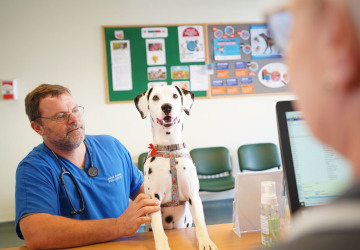
Keep your cat worm-free with Edgewood Vets
March 7, 2018
If the very thought of your cat having worms makes you feel squeamish, don’t worry – Edgewood Vets team see it every day and are experts when it comes to both treatment and prevention.
Here you’ll find how to spot the signs of a parasitic infestation. If you’re worried that your cat may have picked up worms or you need any further advice, why not book a nurse-led appointment to put your mind at ease? Just contact us and we’ll be happy to help.
How can I prevent my cat from getting worms?
Unfortunately, worms are so common that most cats will suffer an infestation at some point in their lives. But there are steps you can take to reduce the risk as our head nurse, Jessica, suggests:
- Keep your cat indoors to avoid exposure to fleas, faeces and infected cats or rodents.
- Make sure your home, garden and pets are flea-free.
- Practice good hygiene and wear gloves when changing cat litter or handling faeces. It’s also important to frequently dispose of stools.
- Talk to us about parasite treatment and prevention.
What are the most common types of worms in cats?
There are eight types of intestinal worms which can infect your cat, and some can be spread between cats and people. Roundworms and tapeworms are the most common.
- Roundworms resemble spaghetti and are 3-4in long. Nursing kittens can get roundworms from an infected mother’s milk, while adult cats can acquire them by ingesting an infected rodent or the faeces of an infected cat.
- Hookworms are less than an inch long and live primarily in the small intestine. Because they feed on an animal’s blood, hookworms can cause life-threatening anaemia, especially in kittens. Hookworm eggs are passed in the stool and hatch into larvae, and a cat can become infected either through ingestion or skin contact.
- Tapeworms are segmented parasites, 4in to 28in long. Cats become infected by ingesting a host, like a flea or rodent.
Symptoms
If your cat has any of the following symptoms – vomiting, diarrhoea, weight loss, dull coat, lethargy or dark stools – it may be the victim of a parasite, so keep your pet safe from worms by calling 01621 828381 and booking a nurse-led appointment.






